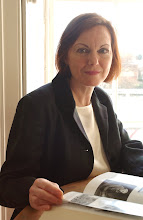
I have just received an e.mail from Vivienne Lewis (nee Horne), whose ancestral stories are featured on 30 March 2009 and 21 April 2008. She writes:
'Do you remember you put me into contact with the bursar of Aldro School who had seen the Horne blog on your web site. My second cousin, Rosemary, and her husband plus Paul (my partner) and myself went up to the school at the end of May and Norman kindly showed us around. Seemingly Edgar Horne not only owned the big house that now houses the school but all the surrounding land which comprised the whole of the village of Shackleford which is on the outskirts of Godalming, Surrey.
Inside the school they have a copy of the portrait of Sir Edgar, the original of which is evidently still in the Prudential Head Office. The Edwardian bell-push remains with the various names of the Horne family clearly written under each room. There is an old gong in the hallway plus an old-fashioned telephone. The staircase which Edgar acquired from another old property, which was being pulled down, also remains in situ. Evidently after his wife died he did not wish to remain in the house and moved to another property across the road. It was a very interesting visit and many thanks for being kind enough to forward Norman's e-mail on to me.
Two weeks ago I went up to the Society of Genealogists and found out some further information about the first Horne (Benjamin Horne, 1698-1766) who started the coal factor/merchant business. He has an entry in the Oxford Dictionary of Biography and quite a large one. Seemingly, he started his business when he was 21 when he set up as a middle-man between the colliery owners of the North of England and the main users of coal in London and the suburbs, namely the brewers, soapboilers, dyers etc. As a result of an Act of Parliament he was allowed to set up his own wharves and lighters to ferry the coal ashore. By 1730 he had a financial interest in over 40 collieries (the picture above shows what a colliery would have looked like in Benjamin's day). However, a bit like the present MPs, he skated on thin ice when he issued bonds to the shipmasters to pay the excise duty on their behalf so they could return North quicker to pick up the next load of coal, and then delayed payment. When the Customs Department exposed the fraud that he and other coal factors had been involved in he quickly paid up!!!!! He retired to High Cross, Tottenham, and died in 1766 worth over £70,000.00.
His son, Thomas (1726-1802) was considered by one biographer to be the greatest coal-merchant in London. Succeeding generations entered into various partnerships and finally the business was absorbed into the Charringtons Group.
Hope your project is going well. I still intend to visit the Quaker Library in Euston although I have learnt that the Thomas Horne who was living in Bloomsbury in the 1841 Census had, in fact, left the Society of Friends in 1823.'
Inside the school they have a copy of the portrait of Sir Edgar, the original of which is evidently still in the Prudential Head Office. The Edwardian bell-push remains with the various names of the Horne family clearly written under each room. There is an old gong in the hallway plus an old-fashioned telephone. The staircase which Edgar acquired from another old property, which was being pulled down, also remains in situ. Evidently after his wife died he did not wish to remain in the house and moved to another property across the road. It was a very interesting visit and many thanks for being kind enough to forward Norman's e-mail on to me.
Two weeks ago I went up to the Society of Genealogists and found out some further information about the first Horne (Benjamin Horne, 1698-1766) who started the coal factor/merchant business. He has an entry in the Oxford Dictionary of Biography and quite a large one. Seemingly, he started his business when he was 21 when he set up as a middle-man between the colliery owners of the North of England and the main users of coal in London and the suburbs, namely the brewers, soapboilers, dyers etc. As a result of an Act of Parliament he was allowed to set up his own wharves and lighters to ferry the coal ashore. By 1730 he had a financial interest in over 40 collieries (the picture above shows what a colliery would have looked like in Benjamin's day). However, a bit like the present MPs, he skated on thin ice when he issued bonds to the shipmasters to pay the excise duty on their behalf so they could return North quicker to pick up the next load of coal, and then delayed payment. When the Customs Department exposed the fraud that he and other coal factors had been involved in he quickly paid up!!!!! He retired to High Cross, Tottenham, and died in 1766 worth over £70,000.00.
His son, Thomas (1726-1802) was considered by one biographer to be the greatest coal-merchant in London. Succeeding generations entered into various partnerships and finally the business was absorbed into the Charringtons Group.
Hope your project is going well. I still intend to visit the Quaker Library in Euston although I have learnt that the Thomas Horne who was living in Bloomsbury in the 1841 Census had, in fact, left the Society of Friends in 1823.'
